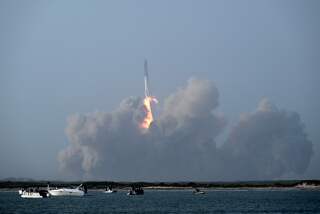NASA’s new spacecraft will remain on the launchpad until Wednesday as SpaceX conducts rocket tests
- Share via
The launch of NASA’s TESS spacecraft, planned for launch Monday afternoon, has been delayed until Wednesday, SpaceX and NASA officials said.
The Transiting Exoplanet Survey Satellite was set to take off at 3:32 p.m. Pacific time from Cape Canaveral Air Force Station in Florida on a SpaceX Falcon 9 rocket.
In a tweet, the aerospace company said the team was standing down to run additional analyses on the guidance, navigation and control systems.
The launch vehicle, a Falcon 9, is a two-stage rocket with nine Merlin engines to boost the first stage and a single Merlin engine to power the second, according to the space agency.
NASA confirmed the reason for delay in another tweet, adding that the spacecraft was “in excellent health and remains ready for launch” in two days’ time.
TESS would take a different approach than NASA’s groundbreaking Kepler Space Telescope, offering a new view of the planets orbiting other stars. Where Kepler looked deep into a single patch of sky, finding planets as far as 3,000 light-years away, TESS will search far and wide, scanning about 85% of the entire sky for planets no farther than 300 light-years away.
The spacecraft will scan over 200,000 stars to find small worlds in our interstellar neighborhood, a few of which could be Earth- or Super-Earth-sized. Other telescopes could then measure their mass to determine whether some of them are rocky, like our home planet. Future missions (like NASA’s James Webb Space Telescope) could probe their atmospheres for signs of molecules that are necessary for life as we know it.
TESS’s launch had appeared on track earlier in the day, when SpaceX reported the weather was 80% favorable.
Mission officials have a certain window of time to launch the spacecraft; but must do so no later than June 2018, according to the agency.

NASA is planning to launch its Transiting Exoplanet Survey Satellite in mid-April. TESS will help scientists study exoplanets that orbit other stars. The trick is to watch them as they pass in front of their host stars.
Follow @aminawrite on Twitter for more science news and “like” Los Angeles Times Science & Health on Facebook.
MORE IN SCIENCE:
NASA is about to step up its planet-hunting game with the launch of TESS
Too much sitting may thin the part of your brain that’s important for memory, study suggests
Singing tail feathers and a high speed dive help this hummingbird find a mate







